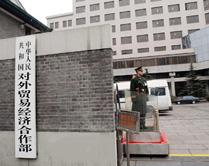 A new institutional overhaul, which is still waiting for approval from the National People's Congress (NPC), seems to have won the hearts of a host of people from within and outside the top legislature.
A new institutional overhaul, which is still waiting for approval from the National People's Congress (NPC), seems to have won the hearts of a host of people from within and outside the top legislature.
The major government restructuring is expected to contribute to a fairer and more efficient administrative system and promote a market economy, they said.
The NPC yesterday heard a draft plan to create several regulatory bodies, notably a banking commission, a State asset management commission and a food and drug administration, in addition to upgrading several other key sectors.
The legislature is expected to vote on the draft scheme on Monday.
Yang Xiang, an NPC deputy, said: "I believe a market economy requires the government to focus more on management at the macro-level and less on concrete cases and details, and that is what the current institutional reform is about.
"The reform greatly reduces the overlapping of the government departments' responsibilities, which will definitely improve efficiency," said Yang, who is also deputy director of the Judiciary Bureau of Central China's Hunan Province.
Yu An, an administrative law professor with Beijing-based Tsinghua University, said: "Without systematic institutional reform, there will hardly be an efficient shift of government function and the overall progress of the market economy will struggle to move smoothly."
Unlike previous government reforms, which were mainly focused on downsizing, the new restructuring attempts to beef up co-ordination between different government departments and clarify their duties, said Ma Jingren, a professor at Shenzhen University in South China's Guangdong Province.
The institutional reform bears far-reaching significance as it comes shortly after the Communist Party of China set in November the target of building a "xiaokang" society -- one that is well-off in the broadest sense, not only materially, but socially.
Yu Hui, another Beijing-based academic, said he believes the government reform will greatly leverage the process of building a xiaokang society in an all-round way.
WTO vs Reform
The reform is being conducted amid intensified global market competition brought about by economic integration around the world, Professor Yu said.
Mait Martinson, Estonian ambassador to China, said the fact that China was opening wider to the outside world and it had entered the World Trade Organization (WTO) increased the need for local administrative institutions to work more efficiently.
Rather than seeking tighter rules for economic and social affairs, the government reshuffle embodies an idea of transforming it into a public service body, which will align it with WTO requirements and the market system, Chinese experts say.
"The institutional reform outlined at the NPC meeting is based on a clear and astute vision for China's future, promising continued strong advances in overall national development and prosperity," said Jia-Bin Duh, president of Cisco China, part of the US-based leading maker of equipment that directs Internet traffic. "This is good for China, as well as the international business community."
New Commission
Into the dustbin of officialdom goes the State Economic and Trade Commission (SETC). The State Development Planning Commission is expected to shed the word "planning" from its name and gain additional duties from the Office for Restructuring the Economic System and SETC, to become the State Development and Reform Commission.
Wilfred Wong, a NPC deputy from Hong Kong and vice chairman of Shui On Holdings Ltd, said the policy-making commission's name change may also be symbolic of China's sweeping transformation from a planned economy.
Yu Xiaosong, chairman of the China Council for the Promotion of International Trade, says he hopes the new commission will go beyond economic concerns and better serve the public in an all-round way, particularly in non-economic fields such as culture, education and environmental protection.
Food and Drug Agency
"Food and drugs are the most critical problems for public health," said Zheng Xiaoyu, director of the State Drug Administration, noting the plan mirrored the strong decision taken by the government on strengthening food and medicine quality controls.
Zheng said the reform will help uncover existing problems within the system.
Safety Agency
Zhang Baoming, a member of the National Committee of the Chinese People's Political Consultative Conference (CPPCC), welcomed the news that the State Administration of Work Safety will be upgraded to strengthen supervision over workplace safety and the coal mining industry.
"This shows the central government and Party's central committee have paid high attention to the issue of work safety," he said.
However, there are also worried and concerns about the restructuring.
Huang Jun, a CPPCC member from Jiangsu Province, said forming new functions through agency mergers will probably lead to overstaffing in new departments.
"If all the provincial, county and township governments establish sub-administrations, it will generate a bloated bureaucracy," Huang said.
(China Daily March 7, 2003)
|

